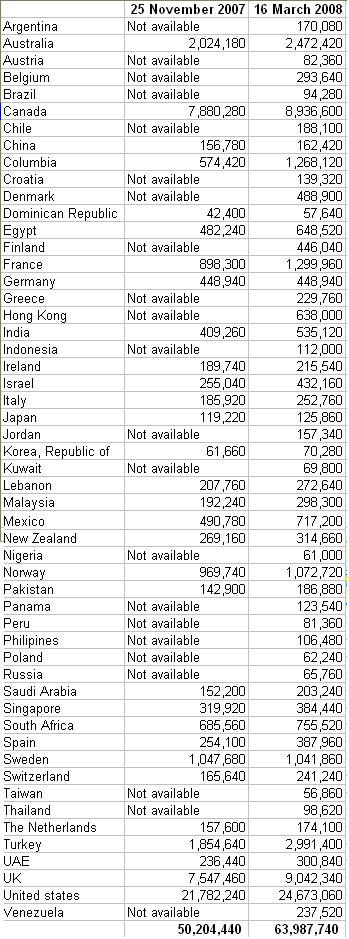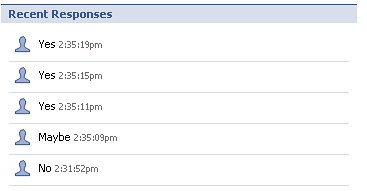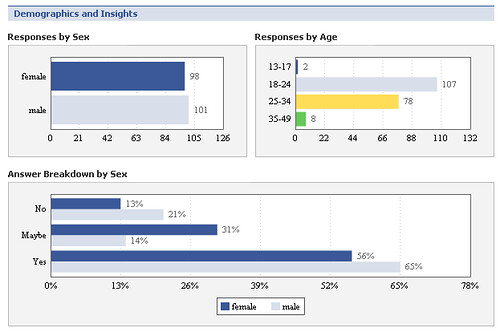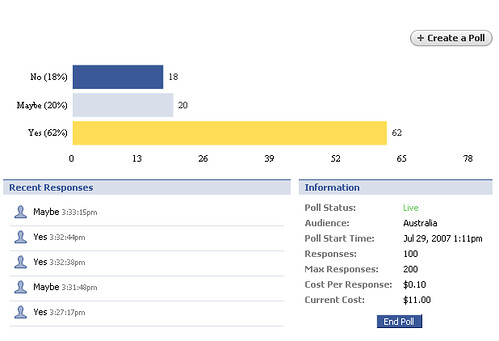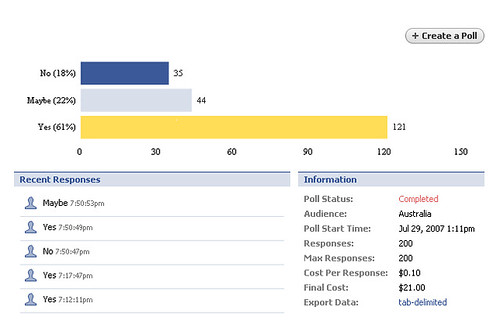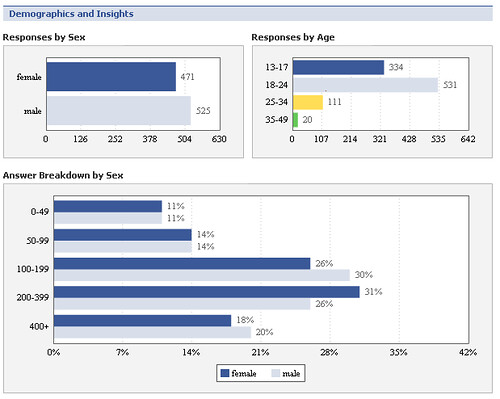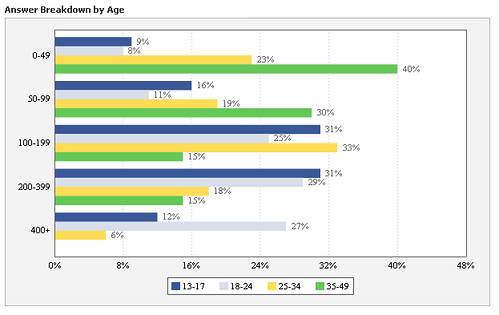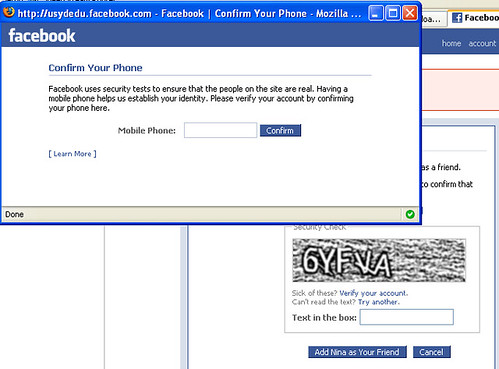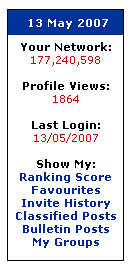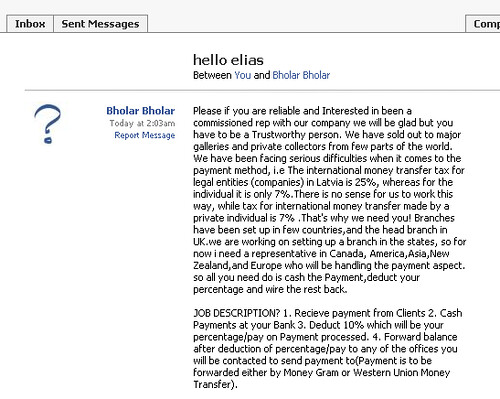Just then, I had an image get shattered. A well respected blogger, whose online persona had me think they were a very cool person offline, is infact, a fat geek with an annoying voice. I can pretty much cross off the list that he can relate to experiences of how Facebook is mentioned in trendy nightclubs on the dancefloor.
Another thing I have noticed: all the major commentators & players of the Internet economy, are usually married, in their 30s or 40s, and almost all come from an IT background.
Don’t get me wrong – the industry has a lot of people that are a goldmine with what they say. They challenge my thinking, and they are genuinely intelligent. But although they are users of web services like Facebook or MySpace – just like the rest of society – they are people experiencing these technologies in the bubble of the technology community. Their view of the world, is not aligned with what’s actually happening in the mainstream. No surprises there – they are the early adopters, the innovators and the pioneers. It’s funny however, that comparable to other services (like Twitter) the adoption amongst the tech community for Facebook has been slow: it was only when the developer network launched that it started getting the attention.
What I want to highlight is that most commentators have no way in the world of understanding the social impact of these technologies in the demograghic where the growth occurs. We all know for example, Facebook is exploding with users – but do we know why it’s exploding? A married man in his 40s with a degree in computer science, isn’t going to be able to answer that, because most of the growth comes from single 20 year olds with an history major.
So what I am about to recount is my personal experience. I am not dressing it up as a thought-piece; I am just purely sharing how I have seen the world take to social networking sites and how it has transformed the lives of my own and the people around me. I’m 23 years old, the people in my life generally fall into the computer clueless category, and I have about 500 Facebook friends that I know through school, university, work, or just life (about ten are in the tech industry).
1) Social networking sites as a pre-screening tool
Observation: I randomly was approached by a chick one night and during the course of our conversation she insisted I knew a certain person. Ten minutes, and 20 more “I swear…you know xxx” – I finally realised she was right and that I did know that person. For her to be so persistent in her claim, she had to be sure of herself. But how can someone be sure of themselves with that piece of information, when I had only met her 30 seconds earlier?
I then realised this chick had already seen me before – via facebook. I know this is the case, because I myself have wandered on a persons profile and realised we have a lot of mutual friends. In those times I would note it is bound to happen that I would meet them.
Implication: People are meeting people and know who they are before they even talk. They say most couples meet through friends. Well now you can explore your friends’s friends – and then start hanging around that friend when you know they know someone you like!
2) Social networking sites getting you more dates
Observation: I met a chick and had a lengthy chat with her, and although she was nice, I left that party thinking I would probably never see her again as I didn’t give out any contact details. That next day, she added me as a friend on Facebook. In another scenario, there was a girl I met from a long time ago and I hadn’t seen her since. We randomly found each other on Facebook, and I’ve actually got to know the girl – picking up from where we left off.
Implication: Social networking sites help you further pursue someone, even though you didn’t get their number. In fact, it’s a lot less akward. Facebook has become a aprt of the courtship process – flirtation is a big aspect of the sites activity.
3) Social networking sites helping me decide
Observation: There was a big party, but I wasn’t sure if I would go because I didn’t know who would go with me. I looked at the event RSVP, and I to my surprise found out a whole stack of people I knew were going.
Implication: Facebook added valuable information that helped me decide. Not knowing what people were going, I probably wouldn’t have gone. Think about this on another level: imagine you were were interested in buying a camera, and you had access to the camera makes of your friends (because the digital photos they upload contain the camera model – as seen with Flickr). Knowing what your friends buy is a great piece of advice on what you want to buy.
4) Social networking sites increasing my understanding of people I know
Observation: I found out when a friend added me on myspace, that she was bisexual – something I never would have realised. Being bi is no big deal – but it’s information that people don’t usually give up about themselves. Likewise, I have since found out about people I went to school with are now gay. Again – no big deal – but discreet information like that increases your depth of understanding about someone (ie, not making gay jokes around them). I know what courses my contacts have studied since I last saw them, and what they are doing with their lives. I also know of someone that will be at one of my travel destinations when I go on holiday.
Implication: You are in the loop about the lives of everyone you’ve met. It’s nothing bad, because these people control what you can see, but it’s great because there are things you know, things you know you don’t know, but now you can find out things you didn’t know that you didn’t know.
5) Social networking sites as a shared calendar
Observation: My little sister is currently going through 21st season – back to back parties of her friends. One of the gripes of 21sts when organising them, is overlap with other peoples. Not only that – but also the physical process of contacting people and getting them to actually RSVP – it’s a pain. However unlike my 21st season experience from a few years ago, my sister has none of these issues. This is because Facebook is like one big shared calender. Another example is how I send my congratulations to birthday friends a lot more than I have in the past because I actually know its their birthday- due to fact our calendars are effectively pooled as a shared calendar.
Implication: Facebook has become an indispensable tool to peoples social lives.
6) Bonus observation – explaining the viral adoption of Facebook
I have a few friends that don’t have Facebook. You can almost count them on the one hand. And when you bring it up, they explode with a “I’m sick of Facebook!” and usually get defensive because so many people hassle them. In most cases, they make an admission that one day, they will join. The lesson here is that Facebook is growing because of peer pressure. The more people in someone’s network, the more valuable facebook becomes to them. When they say 40 million users, it’s actually 40 million sales people.
God bless the network effect.
